On 22 September 2015, at Centro Cultural de Belém, in Lisbon, ANACOM held its eighth international conference, on the theme ''Regulation in the new digital ecosystem''.
ANACOM intended to promote debate on the review of the regulatory framework for electronic communications, in the context of the strategy for the Digital Single Market announced by the European Commission on 6 May, as a fundamental question for the future of regulation.
The speed and extent of the market's evolution is undeniable. Convergence between information, telecom and media technologies has given rise to a highly complex digital ecosystem, involving new players and confronting traditional business models and regulation with a significant set of challenges.
It is essential for those of us who work in this fast-changing environment to look to the future, and to identify and discuss the multitude of issues facing us - at least those we can anticipate. This is particularly important for regulators.
Event location
Registrations
Registrations are closed.Contacts
Av. José Malhoa, 12
1099 - 017 Lisboa
Portugal
Fax: +351 217 211 001
Call free: +351 800 206 665
14:00 Registration
14:30 Opening session
- Fátima Barroshttps://www.anacom.pt/render.jsp?contentId=1128480
Chair of the Board of Directors, ANACOM, and Chair of BEREC 2015Presentation1 (PDF 380 Kb)
Keynote speaker | Digital Single Market Strategy
- Mário Campolargohttps://www.anacom.pt/render.jsp?contentId=1363894
Director, Directorate Net Futures, DG Connect, European CommissionPresentation - Mercado Único Digital (PDF 2258 Kb)
Topic:
The digital single market: what comes next?
15:15 The Digital Ecosystem - Regulation for 2020
Chair: João Confrariahttps://www.anacom.pt/render.jsp?contentId=1128484, Member of the Board of Directors, ANACOM
Speakers:
- Jack Hamandehttps://www.anacom.pt/render.jsp?contentId=1363394
Chairman of the Council, Belgian Institute for Postal services and Telecommunications (BIPT)Presentation - Regulation in the new digital ecosystem (PDF 5739 Kb)
Steffen Hoernig (PDF 1400 Kb)
Professor of Economics, Universidade Nova de Lisboa, Nova School of Business and
Economics
Presentation - O ecossistema digital: regulação para 2020 (PDF 473 Kb)
- Paulo Veríssimohttps://www.anacom.pt/render.jsp?contentId=1363228
Professor, University of Luxembourg, Faculty of Science, Technology and CommunicationPresentation - Novos desafios à segurança e resiliência dos sistemas de comunicações (PDF 5643 Kb)
Topics:
- Trends in the next five to ten years.
- Changes foreseen in the regulatory framework - what do we need to change (spectrum, market regulation, connectivity/access, universal service, etc.)?
16:30 Coffee-break
16:50 New players and business models - the telecom sector in the future
Chair: Nicolau Santoshttps://www.anacom.pt/render.jsp?contentId=1363125 e Pedro Guerreiro, Expresso
Speakers:
Paulo Neves (PDF 217 Kb)
CEO, MEO - Serviços de Comunicações e Multimédia
- Miguel Almeidahttps://www.anacom.pt/render.jsp?contentId=1363893
CEO, NOS Comunicações - Mário Vazhttps://www.anacom.pt/render.jsp?contentId=1363624
CEO, Vodafone Portugal - Comunicações Pessoais - João Coutohttps://www.anacom.pt/render.jsp?contentId=1363124
Director General, Microsoft Portugal
Topics:
- Emerging new “old” challenges: OTT, IoT, big data
- DSM approach and the regulatory framework review
18:05 Closing session
- José Perdigotohttps://www.anacom.pt/render.jsp?contentId=1128483
Vice-Chair of the Board of Directors, ANACOM
Languages:
Portuguese and English.
Interpretation service available.
Online transmission:
Online transmission of the conference was available.
Venue:
Fundação Centro Cultural de Belém
Praça do Império
1449-003 Lisboa
Portugal
Tel.: +351 213612400
Fax: +351 213612500
Email: ccb@ccb.ptmailto:ccb@ccb.pt
URL: Centro Cultural de Belémhttps://www.ccb.pt/Default/pt/Inicio
Parking:
Garagem Sul (Av. da Índia) and Garagem Norte (Rua Bartolomeu Dias)
524 places
Daily from 8:00 am to 12:00 pm
Information for people with restricted mobility:
Access is available exclusively through Garagem Sul (South Garage) (Av. da Índia).
Public Transport:
Bus: 28, 714, 727, 729, 751
Tram: E15
Train: Cais do Sodré-Cascais, Belém station
River connections: Belém
Transportes de Lisboa http://www.transporteslisboa.pt/ (Transports of Lisbon)
Coordinates:
38º41'45.65"N
09º12'27.07"O
Eat & drink:
Bar Terraço (Conference Centre)
Opens everyday from 12:00 pm to 8:00 pm
Sunday and Public Holidays from 10:00 am to 6:00 pm
Restaurant "A Commenda" (Conference Centre)
Opens everyday to Saturday (lunch) from 12:30 pm to 3:00 pm
Sunday (lunch) from 12:30 pm to 4:00 pm
Saturday (dinner) from 7:30 to 11:00 pm
Sandwich Bar (Conference Centre)
From Monday to Friday from 8:00 am to 5:30 pm
ESTEOESTE Restaurante (Jardim das Oliveiras)
Tuesday to Thursday from 10:00 am to 12:00 pm
Friday to Saturday from 10:00 am to 12:00 pm
Sunday from 10:00 am to 11:00 pm
Monday (closed)
Information for people with restricted mobility:
All dining venues are accessible by ramp or elevator.
Accommodation:
For further information on accommodation in Lisbon, please see the website Booking.com https://www.booking.com/searchresults.en-gb.html?aid=397615;label=gog235jc-index-pt-XX-XX-unspec-pt-com-L%3Apt-O%3AwindowsS7-B%3Afirefox-N%3AXX-S%3Abo-U%3Ac;sid=de85007449ab35f23bbcdde5511bbde5;class_interval=1&dest_id=-2167973&dest_type=city&group_adults=2&group_children=0&hlrd=0&index_postcard=0&label_click=undef&no_rooms=1&offset=0&raw_dest_type=city&room1=A%2CA&sb_price_type=total&shw_aparth=1&slp_r_match=0&src=index&ss=lisboa&ss_raw=lisb&ssb=empty and Maisturismo
http://www.visitlisboa.com/Lisbon.aspx.
Further information:
- visitar-lisbon.com
http://www.visitar-lisbon.com/lisbon/index.html
- GUIADACIDADE
http://www.getportugal.com/pt/distrito-lisboa-11
- Câmara Municipal de Lisboa
http://www.cm-lisboa.pt/en
- Turismo de Portugal
http://www.visitlisboa.com/Lisbon.aspx
Conclusions
Some of the main ideas presented at the 8th ANACOM Conference, "Regulation of the new digital ecosystem", held on 22 September 2015 at Centro Cultural de Belém (CCB), Lisbon.
Opening Session
Fátima Barros, Chair of ANACOM's Board of Directors and 2015 Chair of BEREC
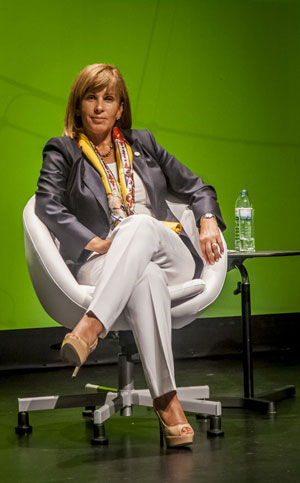 We are at a crucial stage in the evolution of the electronic communications sector: we have seen the traditional boundaries of the sector blur with the convergence of IT services, telecommunications, media & entertainment, which has spawned new business models. Today, more than a sector, we have a new digital ecosystem.
We are at a crucial stage in the evolution of the electronic communications sector: we have seen the traditional boundaries of the sector blur with the convergence of IT services, telecommunications, media & entertainment, which has spawned new business models. Today, more than a sector, we have a new digital ecosystem.- With publication of the European Commission's strategy for the construction of the single digital market in Europe (DSM), which includes a review of the regulatory framework, a discussion on the future of regulation in the electronic communications sector is unavoidable.
- The enormous diversity that exists in the European Union in terms of market maturity, especially in terms of the development of next generation networks (NGN), means that it must be recognised that one size does not fit all. Although NRAs should have a common regulatory toolbox, each regulator should be able to choose the tools that best serve the needs of their own market.
How should the regulatory framework evolve in order to establish a level playing field for all market players? Should we lighten regulation of electronic communications services or, on the contrary, should we broaden the scope of current regulation to include the new players, in particular over-the-top services (OTT)?
- Connectivity is a central problem, particularly when it comes to preventing a digital divide, where sections of the population are excluded from access to fast broadband, and also because many SMEs and start-ups have business models based on e-commerce - this makes connectivity crucial to the development of enterprise in areas furthest away from urban centres.
What is the role of regulation in terms of establishing and promoting an environment which is conducive to investment in NGN? Is the current model appropriate, based as it is on market analysis and on the identification of an operator with significant market power that is then made subject to fibre network access obligations? Or rather, is there a risk that investment falls to suboptimal levels, especially in regions with low population density? Should alternative models of regulation be considered, in particular with the creation of incentives for operators who lead investment in less attractive areas?
- It is important that we try to identify potential market failures that may occur in the future and, from there, assess the need to regulate, co-regulate or deregulate in the context of this new digital ecosystem. Because the world in 2020 will be radically different from the world as it was in 2002 or in 2009, when the current regulatory framework was defined and reviewed, a profound shift in regulatory approach is necessary - we need to seek an approach that is highly effective and proportionate and the least intrusive possible.
Mário Campolargo, Director, Directorate Net Futures, DG CONNECT, European Commission
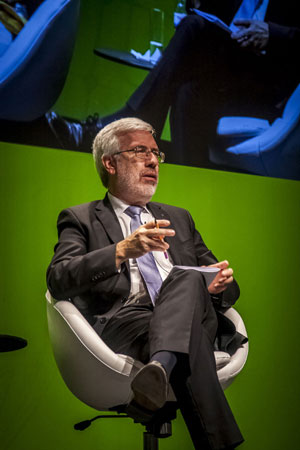 If EU consumers could choose from the full range of EU goods and services when shopping online, they could save 11.7 billion euros each year.
If EU consumers could choose from the full range of EU goods and services when shopping online, they could save 11.7 billion euros each year.- If the same e-commerce rules were applied in all Member States, 57% of companies could initiate or increase online sales to other EU countries.
- In the EU, 62% of companies that want to sell online claim that the high costs parcel delivery are a problem.
- Estimates from studies indicate that, by 2020, megadata analysis could bring additional economic growth in the EU of 1.9%, which is equivalent to an increase of 206 billion euros in GDP.
- A strategy of 'digital by default' in the public sector could provide about € 10 billion of annual savings.
The Digital Ecosystem - Regulation for 2020
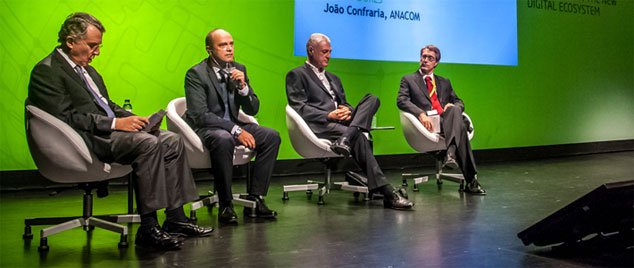
From left to right: João Confraria (ANACOM), Jack Hamande (BIPT), Paulo Veríssimo (Univ. Luxembourg) and Steffen Hoernig (Nova School of Business and Economics)
João Confraria, Member of the Board of Directors, ANACOM
- As regards regulation of market power, everyone will agree on the need to promote competition and that the regulation of certain markets remains necessary where dominant positions persist.
- Another aspect that marks the present is the transformation of the electronic communications market value chain. Today, each electronic communications access generates more value than at any time since the invention of the telephone; but it is also true that the bargaining power of the network operator in capturing a slice of that value is increasingly diminished.
- There are tensions between traditional operators, providers of network and terminal equipment, and providers of online applications and services, particularly with providers of so-called over-the-top services. The creation of a balanced regulatory framework in this area is another major question in this new digital ecosystem.
- A key issue for regulation will be security (who will regulate it? what will be regulated? how?); there are various dimensions to consider: cyber security as a public interest, linked to national security and public security, and cybersecurity as externality, linked to issues of privacy and data protection - various Internet business models are based on the collection of information which, in the "traditional" material world, people usually consider private and would be unwilling to share.
- Consumer protection remains one of the ultimate goals of regulation, regardless of whether markets are competitive, i.e. the protection of the supposedly weakest party in any commercial transaction.
Jack Hamande, Chairman of the Council, Belgian Institute for Postal Services and Telecommunications (BIPT)
- Over the past 20 years, there have been extraordinary changes - we now live in a digital ecosystem where we are permanently connected, people and machines. This new age is marked by the availability of bundles with unlimited services, very high speeds over fibre and cable networks, increased use of large volumes of data, etc.
- There are, however, a number of difficult issues facing us: security, privacy, new IP networks, standardization, Internet of things, new spectrum requirements, copyrights, etc.
- The current context makes regulation more complex: How can end-user freedoms be maintained? do we return to market definition? What will be the level playing field and what will the choices be? How do we address vertical integration and integration of networks, content? How do we deal with consolidation among operators and the emergence of over-the-top operators?
- Regulators have to follow the evolution of the market: apps everywhere, new types of services, all players participating in all markets, lack of boundaries, etc.
- Conclusion: we are no longer just dealing with electronic communications; silos (well-defined and demarcated areas of the market) are a thing of the past.
- We need regulation that addresses the new digital ecosystem, regulation that thinks of the future. This task entails addressing four major topics: cybersecurity, network neutrality, spectrum and access, user protection and universal service obligations.
Paulo Veríssimo, Professor, University of Luxembourg, Faculty of Science, Technology and Communication
- System threats and vulnerabilities are real problems.
- Telcos are information technology companies, not just communications companies, and the Internet/cloud complex is one of our most critical infrastructures.
- It is imperative that nations assess the criticality of systems and the risks which they pose to the activities which they support, including through regular audits, transparency and improvement.
- The first step in strengthening systems and achieving maturity is to know your weaknesses.
- In the case of critical information infrastructures (CII), "security" is not enough, we need "better security", and this involves companies and governments engaging best practice and technologies and entails use of the best people for their implementation.
- The regulator must take these new needs into account in its activity.
Steffen Hoernig, Professor of Economics, Universidade Nova de Lisboa, Nova School of Business and Economics
- The jus-competitive regulatory approach based on relevant markets and a tendency to roll back regulation may not be sustainable - the boundaries separating "markets" are becoming more fluid, while services and combinations of services are changing with increasing rapidity.
- We must question whether regulation should be maintained based on the significant market power test, or whether we need to move towards a philosophy based on providing rapid response to specific market failures.
- What is the ideal structure for the electronic communications market? What will the role of regulation be in achieving and maintaining this market structure?
- The current digital ecosystem also raises the following questions: should regulatory action be extended to new services and OTT services which compete with traditional services? Should regulation serve to protect the value chain of network operators? Should regulation be expanded beyond communications?
New players and business models - the telecom sector in the future?
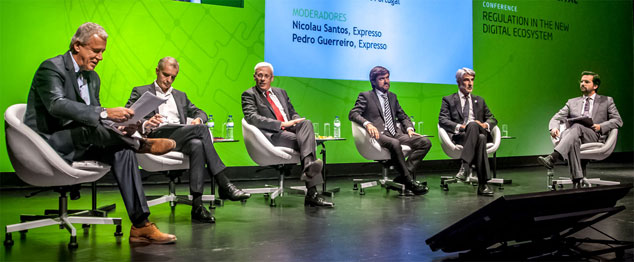
From left to right: Nicolau Santos (Expresso), João Couto (Microsoft), Mário Vaz (Vodafone), Miguel Almeida (NOS), Paulo Neves (MEO) and Pedro Guerreiro (Expresso)
Nicolau Santos, Expresso
- At present, one of the questions that arises is whether the review of the regulatory framework, due to enter into force in 2020, will provide operators with flexibility or if new restrictions will ensue. Will a regulatory framework be established that is balanced for all market players, traditional and OTT operators alike?
- Whether by evolution or by revolution, the electronic communications market will continue to require large operator investments, so that return on this investment remains a critical question, particularly in areas which are more distant from major urban centres.
- A Digital Agenda for Europe sets out a scenario with goals that will not be easily achieved by 2020, particularly in the absence of state assistance.
Miguel Almeida, CEO, NOS Comunicações
- The new concepts (cloud computing, big data, 5G, etc.) are unlikely to have a strong impact on the business model of operators by 2020. The keyword is evolution, not revolution. As such, we will need to watch a strengthening of themes that already feature in the life of operators and their customers.
- 5G before 2020 is not desirable; it is legitimate to have serious doubts about whether a need for 5G exists, a real need on the part of consumers (private and business). Operators will probably be pushed into 5G by technology providers and also by Governments, which view these situations as an opportunity to generate additional revenues.
- The relationship with unregulated operators is entirely asymmetric and it cannot be considered that there is competition. So-called OTT operators provide similar services without being subject to the same conditions, including fees, taxes and regulation. European regulation will have to address this issue - in competition, the rules must be the same for everyone.
- Do the obligations of universal service (US) in their current form still make sense? Less and less. And there is no justification for extending the universal service to include broadband; this would distort competition.
- Over 85% of the population has access to next generation networks; therefore the issue in Portugal is not the availability of quality infrastructure, but digital literacy. Even in rural areas, next-generation networks are already providing coverage.
- In the context of roaming, the intention of the countries of northern Europe to use infrastructure in Portugal without charge, paid for by the shareholders of national companies, just to please Brussels, doesn't make sense. And the claim of reciprocity does not match reality, because the flow of users from the countries of the South to the North is not the same.
- Use of mobile network infrastructure by roaming customers in Portugal has an effective cost and this cost must be paid. Today's tariffs are perfectly acceptable, and while tariffs may be adjusted, a tariff must be charged. If the policy roam like at home goes ahead, it will only increase the burden on Portuguese consumers.
Mário Vaz, CEO, Vodafone Portugal - Comunicações Pessoais
- Regulation will be essential for defining the business model of telecom operators in 2020. The role of operators in the future will depend on the profitability of their business and on a regulatory framework that is balanced for all market players without differences in the treatment given to incumbents and new entrants, such as OTT providers, as regards the rules to be followed.
- If OTT providers in Europe were subject to the same obligations which currently apply to traditional operators, all this potential of Europe for innovation, competitiveness and economic development may be delivered to other geographies. Incidentally, this is already happening today, with these players locating in the USA and elsewhere.
- To date, telecom operators have played an important role in sector innovation. 500 million euros has been invested over the last two years, largely in fibre infrastructure; however, the continuity of investments in fibre will depend on expected profitability. Meanwhile, fibre should be a co-investment, enabling a reduction of excluded economic zones.
- Regulation that favours consolidation and operator scale is important for the economic performance of the operators.
- Roaming is a good example of how European regulation wastes time focusing on a trivial topic, when, from a retail point of view, operators have had a set of solutions for customers for a long time. Regulation should be confined to the rationality of price, price oriented to cost, and must let the market work. Discussions about roaming have been ongoing for years and only now are they talking about OTT, security, etc.
João Couto, Director General, Microsoft Portugal
- The pace of innovation has been breathtaking - this is a revolution. For example: 90% of all data currently existing in the world was generated in the last two years. By 2020, the amount of information generated will be massive. The challenge that faces us is how to store it and process it, because to harness the potential of such information will require large investments.
- Over the past four years, Microsoft has invested 15 billion dollars in data infrastructure (data centres) and telecommunications infrastructure. So there are investments to be made and the earning potential is huge.
- There are shared concerns, particularly in relation to restrictions that incumbents face in using information from their own customer base and the ability to use this information for innovation and to provide new services.
- OTT providers have had a positive impact on the use of communications services and have not sought to replace regular voice traffic; indeed the contribution of OTT to the erosion of traditional operator revenues has been marginal, and to a large extent, what happened over the last 3-4 years has been a factor of competitiveness, competition, promotion of pre-paid plans and bundles.
- Skype works as a complementary service. For example, a mobile voice call through Skype is 50% more expensive, using national tariffs, than the equivalent normal voice call of a communications operator.
- Security is one of the current challenges and regulation of the digital world lags the physical world. There is no clear framework for the digital world, particularly as regards access to digital information.
Paulo Neves, CEO, MEO - Serviços de Comunicações e Multimédia
- PT has always been characterised by innovation and investment. The company's strategy is based on three fundamental pillars: investment, innovation and quality of service.
- PT Inovação will be the innovation centre of Grupo Altice, covering 15 markets, 15 countries.
- Developments in the business model entail new requirements in terms of data storage, Internet of Things, machine to machine, etc. In this field, solutions are already being worked on, including some over-the-top solutions, for example, MEO Cloud.
- The Data Center in Covilhã is an important part of PT's strategy to be able to offer the best services to customers.
- Investment in fibre will only be made when there are conditions for appropriate return and where regulatory conditions are conducive, i.e., we cannot continue to endure falling revenues due to regulatory measures and continue to invest. On the other hand, investment also depends on levels of demand, and in this respect digital literacy is a very important issue.
Pedro Guerreiro, Expresso
- We have heard talk of 5G, cloud computing, big data, Internet of Things, Digital Single Market, changes in the regulatory framework, etc. There has also been discussion on the impact that these may or may not have on the business model of companies which, moreover, are facing new competitors, or maybe they are not competitors: OTT providers, which, without paying for it or financing it, use the infrastructure of traditional operators and benefit from access to compete with their applications. Furthermore, a lack of available investor funds, and the current difficulties of public investment, constrains investment.
- But will the business models change so quickly? Maybe not. We are not seeing a revolution, but evolution. We will certainly see improvement s in connectivity and a continued commitment to innovation. However, there may be no 5G before 2020. Unless manufacturers and Governments press in that direction, maybe more as a means to generate revenue than in response to the needs of consumers which may not yet exist.
- The pace of developments in the electronic communications sector is indeed breathtaking and unstoppable or is it? This is a sector where investment is strong and ongoing, but perhaps too fast. We had 3G, then 4G, convergence, and now 5G, when investment in 4G has not yet been recuperated and the network has not returned a profit, at least in Portugal. And the truth is that the rates of return achieved by telecom operators in Europe are lower than those achieved on other continents.
Closing session
José Perdigoto, Vice-Chairman of the Board of Directors, ANACOM
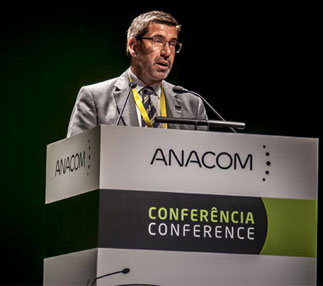 There have been more questions than answers, which is natural, given that we are looking at a sector undergoing profound transformation and also with a time horizon of 4-5 years (2020).
There have been more questions than answers, which is natural, given that we are looking at a sector undergoing profound transformation and also with a time horizon of 4-5 years (2020).- The representative from the EC brought an important message. In this time of change, we should look to the future with different perspectives: that of consumers, operators, competition in the market, and also the economy, given that the digital economy can provide a major factor for growth in Europe and for the recovery of competitiveness, and research and innovation. It was announced that more disruptive and more ambitious proposals can be expected from the EC for the new regulatory framework, which creates increased expectations.
- On the regulation panel, the focus was on the concept of digital ecosystems as a new starting point. We need to forget the telecommunications sector as it was a few years ago: today there is a real digital ecosystem without silos and without boundaries, which brings new challenges in terms of regulation. Issues related to access to infrastructure and (next generation) networks will remain, but there will be new challenges of security, privacy and personal data protection.
- The debate also gave rise to the idea that it will be necessary to create a level playing field between traditional and OTT operators.
- Whatever the future - regulation, co-regulation or deregulation - the important thing is that regulation is conducted with enhanced agility and speed.
- The panel on future business models set out two views: From traditional operators, focusing more on a scenario of market evolution, and from new operators (OTT), who see a revolution and major change. With regard to telecommunications, priorities remain focused on quality connectivity, with the respective network investment, quality of service and innovation, while new business opportunities are seen in services. Another strong message from the panel was that profitability and return are crucial if investments are to continue. At the same time, questions were raised about how revenue generated in the new digital ecosystem will be shared.
- In this context it is essential that all respond to the EC's consultation, which constitutes a unique opportunity for consumers, businesses and other institutions to present their vision of the future of the electronic communications sector.
- Videos of ANACOM Conference 2015: Regulation in the new digital ecosystem https://www.anacom.pt/render.jsp?contentId=1372335&backContentId=1361390





